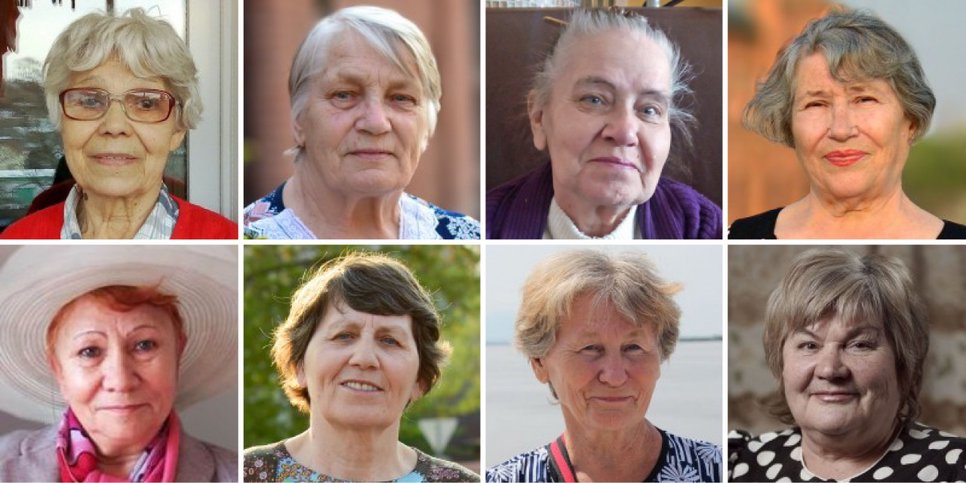In the photo from left to right, from top to bottom: Elena Zaishchuk, Nina Purge, Kaleria Mamykina, Lyubov Galaktionova, Vera Zolotova, Raisa Usanova, Maya Karpushkina, Olga Opaleva
In the photo from left to right, from top to bottom: Elena Zaishchuk, Nina Purge, Kaleria Mamykina, Lyubov Galaktionova, Vera Zolotova, Raisa Usanova, Maya Karpushkina, Olga Opaleva
Hunting the Elderly: Security Forces List Older Women in the Ranks of Extremists
Primorye Territory, Arkhangelsk Region, Khakassia, Khabarovsk Territory, Kamchatka Territory, Rostov Region, Moscow Region, Ivanovo Region, Chelyabinsk Region, Smolensk Region, Kaluga RegionSpecial forces break into a defenseless elderly woman. Ambulance, hospital, undermined health. She was watched as she prayed, read, sang, and talked to others about God. For the security forces, she is an "extremist". They worked this scenario on at least 20 Russian women from 60 to 87 years old.
Almost all law enforcement agencies are engaged in surveillance and raids on dissident pensioners: the FSB, the prosecutor's office, the Investigative Committee, the National Guard, the Federal Penitentiary Service, the riot police, and the SOBR.
Heart attacks, strokes, exacerbations of chronic diseases and complications after surgery are just some of the consequences of the blind or biased application of anti-extremist legislation, which has become the basis for the persecution of older believers.
Particularly illustrative is the situation in Vladivostok, where charges of extremism were brought against six elderly women at once: Elena Zaishchuk (85 years old), Raisa Usanova (72 years old), Nina Purga (79 years old), Nailya Kogai (68 years old), Lyubov Galaktionova (73 years old) and Nadezhda Anoykina (62 years old). From the stress received due to the actions of the security forces, women's already poor health worsens.
In addition, the criminal prosecution had a negative impact on the financial situation of innocent people. Nailya Kogai completely lost her livelihood, since all her savings were blocked with the beginning of the criminal prosecution.
Two pensioners from Spassk-Dalny (Primorsky Krai), Olga Panyuta (60 years old) and Olga Opaleva (67 years old), may end up in prison on the same charges. They spent 2 days in the temporary detention facility, and then 357 days under house arrest.
For Opaleva, such shocks could cost her life. The night before the search, doctors diagnosed her with a heart attack, after which she spent 2 days in a prison cell. And during one of the trips to the court, right in the convoy car, she had a stroke, which resulted in paralysis of the entire left side of her body, as well as severe headaches. The criminal case has not been closed.
Other women of venerable age also fell under the article on extremism because of their religious beliefs:
- Валентина Барановская (68 лет) из Абакана (Хакасия);
- Майя Карпушкина (70 лет) из Хабаровска;
- Людмила Пономаренко (69 лет) из Ростова-на-Дону;
- Зинаида Крутякова (61 год) из Подмосковья;
- Вера Золотова (73 года) из Елизово (Камчатский край);
- Светлана Рыжкова (66 лет) из Шуи (Ивановская область);
- Любовь Асатрян (69 лет) и Галина Дергачева (63 года) из Магадана;
- Валентина Владимирова (63 года) и Татьяна Галькевич (60 лет) из Смоленска;
- Валентина Суворова (71 год) из Челябинска;
Olga Veryovkina, 87, was searched by a group of armed law enforcement officers in Kaluga. "A full brigade in the camouflage of militants. The ruling was not shown. They say, "Get up!" and I say, "I can't, I'm weak." My blood pressure rose from 200 to 115, "says Olga herself.
Often, during special events, security officials make excuses: they say, no personal claims against believers, it's just work. But, given that the intimidating actions of the security forces pose a real threat to the lives of elderly civilian women, some are wondering: are such harsh measures justified? Commenting on the raids in Kaluga, lawyer Anton Omelchenko said: "If our law enforcement officers, in order to come to an elderly woman, gather a crowd, put on masks, take weapons with them, then what cowards they are!"
The criminal case against 78-year-old Kaleria Mamykina, who has been under surveillance for more than a year, stands apart. According to operatives, reading the Bible and talking to friends about God are criminal acts. The investigation lasted seven months in her case, until the investigator came to the conclusion that the accused "exercised her right to freedom of religion, provided for in Article 28 of the Constitution of the Russian Federation, and therefore there was no corpus delicti in her actions."
